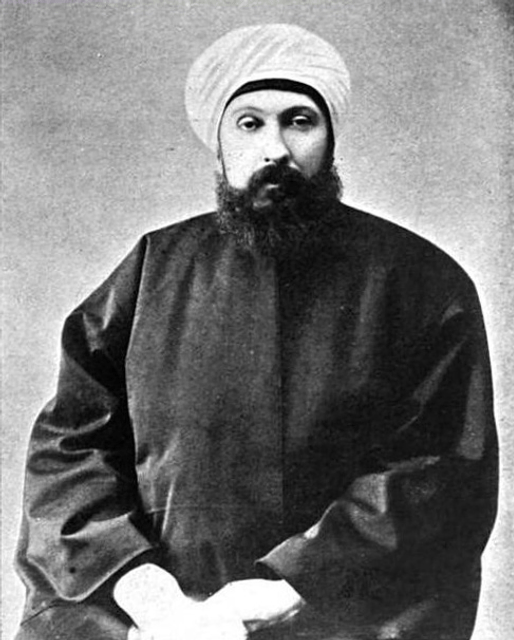Shaykh al-Islām

Shaykh al-Islām

Shaykh al-Islām (Arabic: شيخ الإسلام, romanized: Šayḫ al-Islām; Ottoman Turkish: شیخ الاسلام, romanized: Şhaykḫu-l-İslām or Sheiklı ul-Islam[1]) was used in the classical era as an honorific title for outstanding scholars of the Islamic sciences.[2] [] [3] It first emerged in Khurasan towards the end of the 4th Islamic century.[2] [] In the central and western lands of Islam, it was an informal title given to jurists whose fatwas were particularly influential, while in the east it came to be conferred by rulers to ulama who played various official roles but were not generally muftis. Sometimes, as in the case of Ibn Taymiyya, the use of the title was subject to controversy. In the Ottoman Empire, starting from the early modern era, the title came to designate the chief mufti, who oversaw a hierarchy of state-appointed ulama. The Ottoman Sheikh al-Islam (French spelling: cheikh-ul-islam[29]) performed a number of functions, including advising the sultan on religious matters, legitimizing government policies, and appointing judges.[2] [] [5] Modern times have seen the role of chief mufti carried out by Grand Muftis appointed or elected in a variety of ways.[3]
Classical usage
Like other honorific titles starting with the word sheikh, the term shaykh al-islam was reserved in the classifical era for ulama and mystics. It first appeared in Khurasan in the 4th/10th century.[2] [] In major cities of Khurasan it seems to have had more specific connotations, since only one person held the title at a given time and place. Holders of the title in Khurasan were among the most influential ulama, but there is no evidence that they delivered fatwas. Under the Ilkhans, the Delhi Sultanate and the Timurids the title was conferred, often by the ruler, to high-ranking ulama who performed various functions but were not generally muftis.[2] []
In Syria and Egypt the title was given to influential jurists and had an honorific rather than official role. By 700/1300 in central and western lands of Islam the term became associated with giving of fatwas. Ibn Taymiyya was given the title by his supporters but his adversaries contested this use.[2] [] For example, the Hanafi scholar 'Ala' al-Din al-Bukhari issued a fatwa stating that anyone who called Ibn Taymiyya "Shaykh al-islam" had committed disbelief (kufr).[6][7] There is disagreement on whether the title was honorific or designated a local mufti in Seljuq and early Ottoman Anatolia.[2] []
The following Islamic scholars were given the title "shaykh al-islam":
Ahmad Ibn Hanbal (b. 164 A.H.)
Al-Daraqutni[8] (b. 306 A.H.)
Ibrahim Niasse[10] (b. 165 A.H.)
Abu Hamid al-Isfarayini[8] (b. 344 A.H.)
Al-Bayhaqi[8] (b. 384 A.H.)
Abu Ishaq al-Shirazi[8] (b. 393 A.H.)
Abu Talib al-Makki[11] (b. 386 A.H.)
Al-Juwayni[12] (b. 419 A.H.)
Fakhr al-Din al-Razi[13] (b. 544 A.H.)
Ibn al-Jawzi[8] (b. 509/510 A.H.)
Ibn Daqiq al-'Id[16] (b. 625 A.H.)
Al-Nawawi[17] (b. 631 A.H.)
Ibn Taymiyyah[18] (b. 661 A.H.)
Taqi al-Din al-Subki[19](b. 683 A.H.)
Taj al-Din al-Subki[20] (b. 727 A.H.)
Ibn Hajar al-Asqalani[21] (b. 773 A.H.)
Ibn Hajar al-Haytami[26] (b. 909 A.H.)
Syed Mohammed Madni Ashraf(Kichhauchha Sharif) India
In the Ottoman Empire
In the Ottoman empire, which controlled much of the Sunni Islamic world from the 14th to the 20th centuries, the Grand Mufti was given the title Sheikh ul-islam (Ottoman Turkish: Şeyḫülislām). The Ottomans had a strict hierarchy of ulama, with the Sheikh ul-Islam holding the highest rank. A Sheikh ul-Islam was chosen by a royal warrant amongst the qadis of important cities. The Sheikh ul-Islam had the power to confirm new sultans, but once the sultan was affirmed, it was the sultan who retained a higher authority than the Sheik ul-Islam. The Sheikh ul-Islam issued fatwas, which were written interpretations of the Quran that had authority over the community. The Sheikh ul-Islam represented the law of shariah and in the 16th century its importance rose which led to increased power. Sultan Murad appointed a Sufi, Yayha, as his Sheikh ul-Islam during this time which led to violent disapproval. The objection to this appointment made obvious the amount of power the Sheikh ul-Islam had, since people were afraid he would alter the traditions and norms they were living under by issuing new fatwas.
The office of Sheikh ul-islam was abolished in 1924, at the same time as the Ottoman Caliphate. After the National Assembly of Turkey was established in 1920, this office was in the Shar’iyya wa Awqaf Ministry until 1924, when the Ministry was abolished due to separation of religion from state, the office was replaced by the Presidency of Religious Affairs. As the successor entity to the office of the Sheikh al-Islam, the Presidency of Religious Affairs is the most authoritative entity in Turkey in relation to Sunni Islam.
See also
Allamah
Mufti
Sheikh
Sheikh (Sufism)
Hadrat
Grand Mufti
Hujjat al-Islam